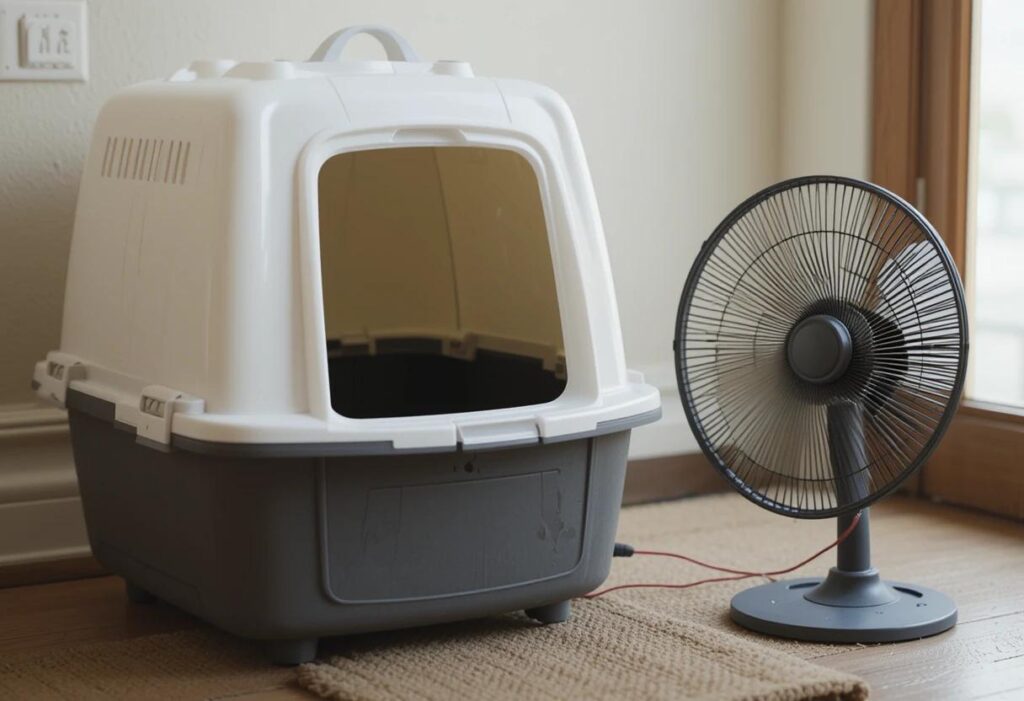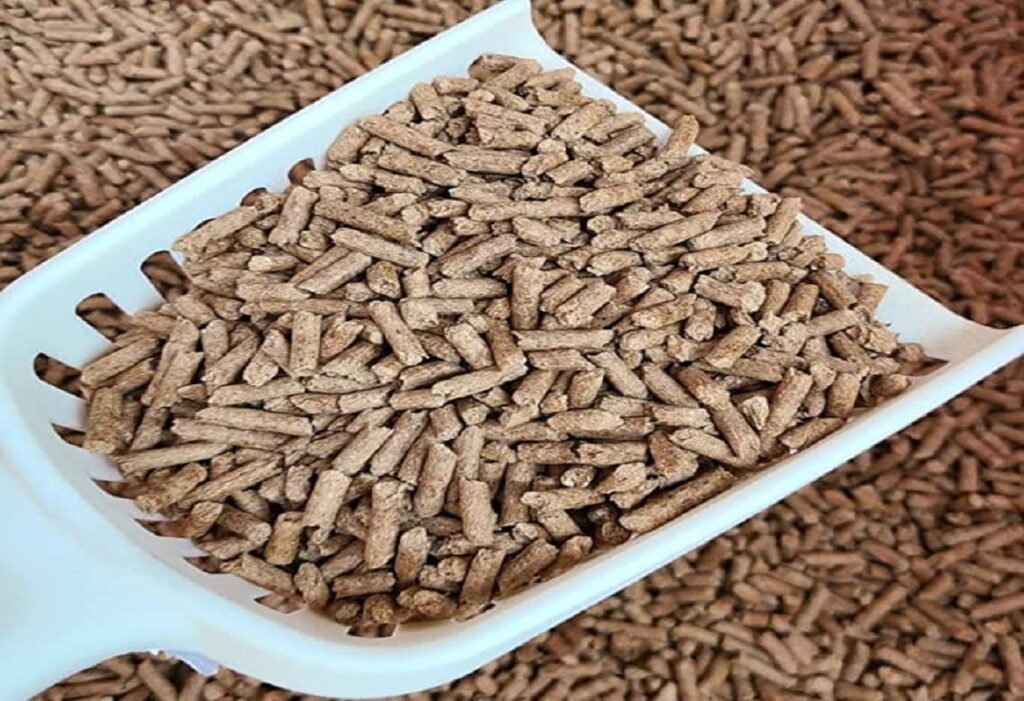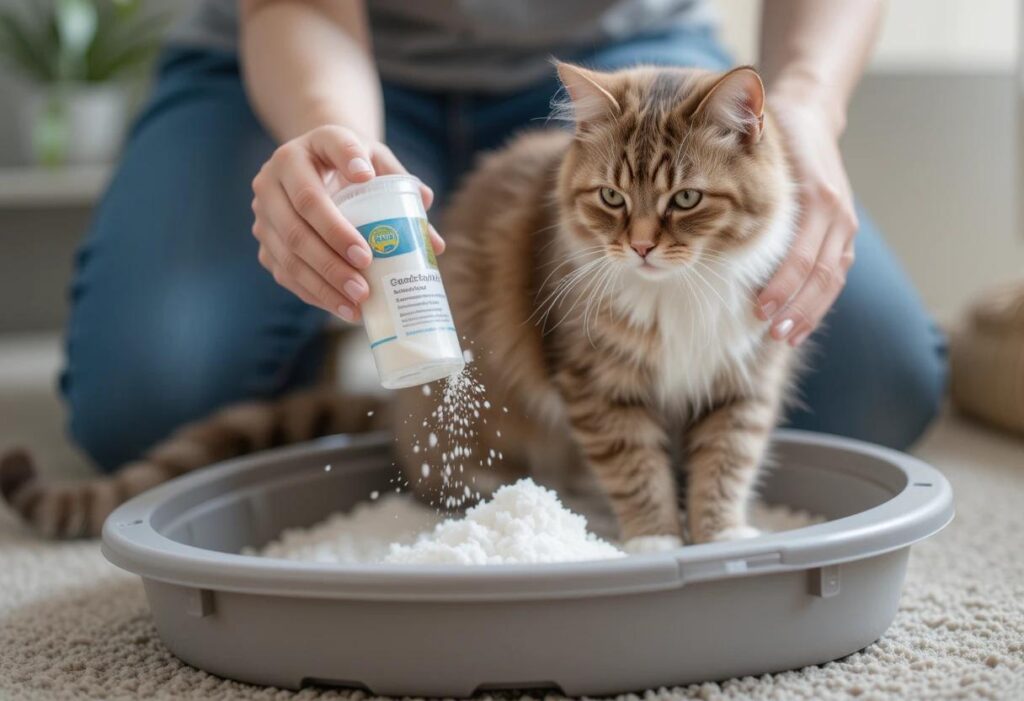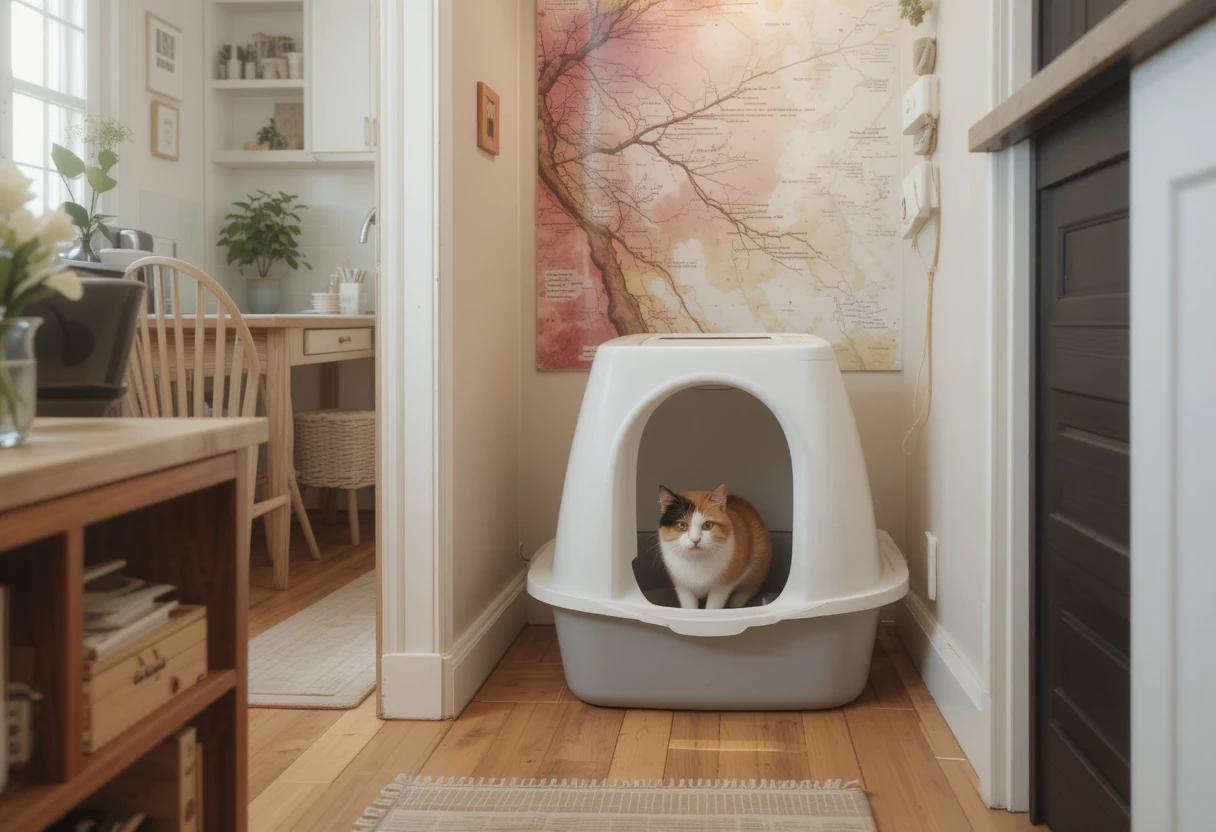Manage Litter Box Odor
Living in a small apartment with a cat can be a truly fulfilling experience. Cats are beloved for their playful, independent, and affectionate nature. They make excellent companions, especially for individuals who live in apartments or smaller spaces. However, one of the common challenges faced by apartment dwellers with feline friends is to manage litter box odor, which can become more pronounced in confined spaces.
Litter boxes, while essential for a cat’s health and hygiene, can unfortunately create unpleasant smells. Small apartments, with their limited space and airflow, make it even harder to keep things smelling fresh. Fortunately, with a few smart strategies, managing litter box odor can become a much easier task. In this article, we will share practical tips and solutions to keep your small apartment smelling clean and fresh while ensuring your cat is comfortable and happy.
Table of Contents
Why Does Litter Box Odor Become a Problem in Small Apartments?
Cats are naturally clean animals. They tend to groom themselves meticulously, and they instinctively bury their waste. Despite their cleanliness, a litter box can quickly become a source of bad odor if it’s not managed properly. In larger homes or spaces with better ventilation, odors tend to dissipate more easily. In smaller apartments, however, odors can linger and become stronger due to the limited airflow and the lack of space for odors to spread out.

Several factors contribute to the issue:
- Urine and Feces: These are the primary sources of litter box odors. If waste is left in the box for too long, it can release strong, unpleasant smells that quickly fill up a small room or apartment. This is especially true if the litter isn’t changed regularly.
- Poor Ventilation: Many apartments, especially those in older buildings, may not have great ventilation. In small spaces, the lack of airflow can cause odors to become trapped and circulate throughout the room.
- Type of Litter: Some types of cat litter are not as effective at absorbing moisture or controlling odors. Choosing a poor-quality litter can lead to faster odor buildup.
Understanding these factors helps you realize that it’s not just about cleaning the litter box frequently—it’s about creating the right environment to minimize odor buildup.
How to Effectively Manage Litter Box Odor in Small Apartments
With the right strategies and a little maintenance, you can manage litter box odor effectively and keep your apartment smelling fresh. Here are several helpful tips to ensure your cat’s litter box stays clean, and the odor doesn’t take over your apartment.
1. Choose the Right Cat Litter
Selecting the right type of cat litter is one of the most important decisions you can make when it comes to controlling litter box odor. Not all cat litters are created equal, and some do a better job of controlling odors than others.
Here are some popular types of cat litter and how they fare with odor control:
- Clumping Litter: Clumping litter forms solid clumps when it comes into contact with moisture, making it easy to scoop out waste and reducing odor. Clumping litters often contain clay or other absorbent materials like bentonite. Clay-based clumping litters are effective at controlling odor, but they are not eco-friendly. If you want to go the more sustainable route, consider alternatives like corn-based, wheat-based, or tofu-based clumping litters. These offer similar clumping action and are much more eco-friendly.
- Silica Gel Litter: Silica gel litter consists of tiny beads that absorb moisture and neutralize odors. It’s highly effective at keeping the litter box dry and controlling odors, but it can be more expensive than clumping litters. While silica gel may need to be replaced more often, it’s a great option if you need a longer-lasting solution.
- Wood and Paper Litter: If you prefer eco-friendly options, wood-based litters made from pine, cedar, or other natural woods are a great choice. These types of litter have natural odor-neutralizing properties and can be very effective. Recycled paper litter are also a biodegradable alternative, but they don’t clump as well as other types. These are perfect for those who want to reduce their environmental footprint.

- Non-Clumping Litter: Non-clumping litter doesn’t form clumps when it absorbs moisture, but it’s still a great odor-absorbing option. It might not be as convenient for daily scooping, but it’s an affordable option for those who don’t mind a bit more maintenance.
When choosing the right litter, remember to select one that is not only effective at controlling odors but also comfortable for your cat to use.
2. Scoop the Litter Box Daily
Scooping the litter box is an essential task for managing odor. If waste is left in the litter box for too long, it will begin to decompose and emit strong, unpleasant smells. By scooping the litter box at least once a day, you are removing waste before it has the chance to spread odors throughout your apartment.
If you have more than one cat, or if you have a particularly large or messy cat, consider scooping more than once a day. The more frequently you scoop, the less likely odors are to accumulate.
In addition to daily scooping, be sure to change out the litter completely every 1 to 2 weeks. Over time, even the best litter will absorb moisture and develop a strong odor that isn’t easily eliminated with just scooping. Fresh litter will help keep the box smelling cleaner for longer.
3. Use Litter Deodorizers or Baking Soda
Even with regular scooping, some lingering odors may still develop. To help control these odors, consider using a litter deodorizer or an all-natural option like baking soda.
- Baking Soda: Baking soda is a cheap, non-toxic way to neutralize odors in your cat’s litter box. Simply sprinkle a thin layer of baking soda on top of the litter after each scoop. Baking soda absorbs moisture and neutralizes odors effectively, helping to keep the box fresh without overwhelming your cat with strong smells.
- Litter Deodorizers: There are many deodorizing products designed specifically for litter boxes. These come in the form of powders, sprays, and pellets and are made to neutralize odors and absorb moisture. Choose a product that is pet-safe and does not contain harsh chemicals. It’s important to use deodorizers that won’t irritate your cat’s sensitive nose.

4. Proper Ventilation Is Key
One of the most important aspects of odor control in small apartments is proper ventilation. Without good airflow, odors can get trapped and circulate throughout your space, making it harder to eliminate them.
Here are some effective ways to improve ventilation in the room with your cat’s litter box:
- Open Windows: If the weather allows, open the windows to allow fresh air to circulate in the room. Even cracking the window open for a few hours a day can make a significant difference in improving airflow and helping to keep the space smelling fresher.
- Use a Small Fan: A fan can help improve airflow in a room, particularly if you don’t have access to an outdoor window. Place a small fan in the room to move the air and help disperse odors. The constant air movement helps prevent smells from becoming too concentrated in one spot.
- Air Purifiers: Investing in an air purifier is another great way to keep your apartment smelling fresh. Many air purifiers come with filters designed to remove pet dander, dust, and odors. This is especially helpful for homes with multiple pets, as air purifiers can reduce the buildup of both allergens and odors.
5. Choose the Right Location for the Litter Box
The location of your cat’s litter box plays a significant role in controlling odors. By placing the litter box in the right spot, you can prevent odors from spreading throughout your entire apartment.
Here are some ideal locations for your cat’s litter box:
- Bathroom: If possible, place the litter box in the bathroom. Bathrooms are usually smaller, which means odors are less likely to spread. Additionally, bathrooms tend to have more ventilation, making them an ideal spot for odor control.
- Laundry Room: If your apartment has a laundry room, consider placing the litter box there. Laundry rooms are usually tucked away from the main living areas, which helps contain odors. Plus, they often have more airflow, helping to control smells.
- Balcony or Porch: If your cat is comfortable with outdoor spaces, consider placing the litter box on a balcony or porch. This will provide your cat with more room and fresh air while helping to keep odors out of your main living areas. However, make sure the space is safe and secure.
- Low-Traffic Areas: Choose a location that is away from high-traffic areas like your living room or kitchen. A quiet corner or tucked-away spot will minimize the spread of odors throughout your apartment.
6. Consider Covered Litter Boxes
Covered litter boxes can be a great solution for controlling odors in small apartments. These types of litter boxes have a lid or hood that helps to contain smells inside. Some covered boxes also have built-in filters that absorb and neutralize odors, making them even more effective.
However, not all cats are comfortable using covered boxes. Some cats prefer open spaces and may feel trapped or claustrophobic inside a covered box. Test the covered litter box to see if your cat is comfortable using it, and make sure the box is well-ventilated to avoid any unpleasant odors building up inside.
7. Clean the Litter Box Thoroughly
Regular scooping and litter changes are essential, but cleaning the actual litter box is just as important. Over time, urine can seep into the sides of the plastic box, leading to lingering odors that won’t go away with just scooping. To keep the box smelling fresh, clean it thoroughly every 2-3 weeks or as needed.
To clean the litter box:
- Empty the Box: First, remove all litter and dispose of it properly. If you use liners, take them out along with the used litter.
- Wash with Soap: Use warm water and mild soap to clean the box. Avoid using harsh chemicals or heavily scented products, as they can leave a lingering smell and irritate your cat’s sensitive nose.
- Dry the Box: After cleaning, dry the box thoroughly before refilling it with fresh litter. Excess moisture can contribute to odor buildup.

8. Use Litter Box Liners
Some cat owners find that using litter box liners makes cleaning up easier and helps control odor. These liners prevent waste from sticking to the sides of the box, making it easier to dispose of the used litter. They can also help reduce odors by preventing moisture from soaking into the plastic.
However, some cats may not like the feel of liners, and they may refuse to use the box. It’s important to observe your cat’s preferences and see if they’re comfortable with the liners before using them regularly.
Final Thoughts
Managing litter box odor in a small apartment doesn’t have to be difficult. By following these tips and incorporating some simple habits into your routine, you can keep your apartment smelling fresh and odor-free while keeping your cat happy and healthy.
By choosing the right litter, scooping regularly, using deodorizers, and ensuring proper ventilation, you’ll be well on your way to creating a comfortable environment for both you and your feline friend. So, take the time to implement these steps, and enjoy a clean and odor-free apartment with your beloved cat!
Ready to Become the Best Cat Parent Ever?
FAQs
1. How can I stop my cat’s litter box from smelling bad in my small apartment?
The best way to keep your cat’s litter box from smelling bad is by scooping it every day and changing the litter every 1-2 weeks. You can also use baking soda or a litter deodorizer to help absorb the smell. Make sure the room is well-ventilated by opening a window or using a fan. Choosing the right litter that controls odor will also help a lot!
2. What’s the best type of litter to reduce odor?
Clumping litter is usually the best at controlling odors because it forms solid clumps when it touches moisture, which makes it easier to scoop out the waste. Silica gel litter also works well, as it absorbs moisture and keeps things dry. You can also try wood-based or recycled paper litter if you want an eco-friendly option!
3. How often should I scoop the litter box to keep it fresh?
Ideally, you should scoop the litter box every day to prevent odors from building up. If you can, scoop it more than once a day, especially if you have more than one cat. The more often you scoop, the fresher the box will stay!
4. Can I use regular baking soda in the litter box to stop odors?
Yes! Baking soda is a natural and safe way to neutralize odors in the litter box. You can sprinkle a small amount on top of the litter after you scoop it each day. Just make sure not to use too much, as it might irritate your cat’s sensitive nose.
5. Is it okay to use a covered litter box to control odor?
A covered litter box can help contain the smell better than an open one, but you need to keep it clean. Some cats don’t like using covered boxes because they can feel cramped inside, so make sure your cat is okay with it. If they are, it’s a good option for keeping odors in check.
6. How do I keep the litter box area smelling fresh if I don’t have good ventilation?
If you don’t have great airflow, try using an air purifier or a small fan in the room where the litter box is kept. Also, open the windows when possible to let fresh air in. If you don’t have any ventilation, consider moving the litter box to a more open spot, like a bathroom, where it might be less stuffy.
7. Can I use a cleaning product with a strong smell to clean the litter box?
It’s best to avoid cleaning products with strong smells, as they can hurt your cat’s sensitive nose. Instead, use a mild soap or a natural cleaner, like a mix of water and vinegar, to wash the box. This way, the box gets cleaned without leaving a harsh smell behind.
8. How do I know if my cat is okay with the type of litter I’m using?
If your cat suddenly starts avoiding the litter box, it might be because they don’t like the type of litter. Cats are pretty picky about their litter, so if they stop using it, you might need to try a different kind. Watch for signs like scratching the sides of the box but not going in or having accidents outside the box.
9. Should I use a litter box liner to control odors?
Litter box liners can help prevent waste from sticking to the sides and make cleaning up easier. However, not all cats like using litter boxes with liners, so you’ll need to see if your cat is comfortable with it. If they seem to like it, it can help reduce odors and make the box easier to clean.
10. Can I place the litter box anywhere in my apartment, or is there a good spot?
It’s best to place the litter box in a quiet, low-traffic area where your cat can use it without feeling disturbed. Bathrooms, laundry rooms, or balconies (if your cat is comfortable with outdoor spaces) work well. Just make sure the area has some airflow to prevent odors from getting trapped.
Eco-Friendly Cat Litter Options: What’s Best for Your Pet and the Planet?

